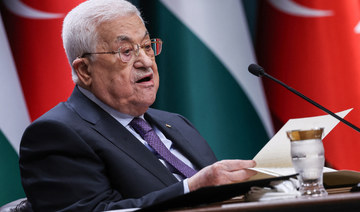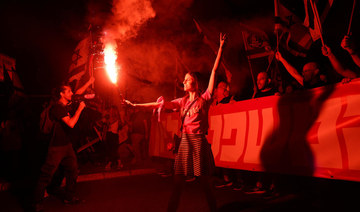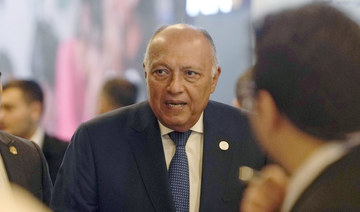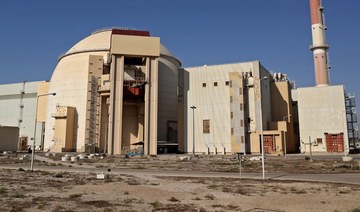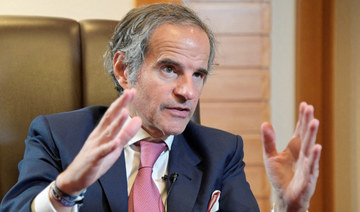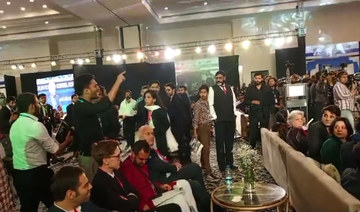ASA’EL, West Bank: With attention focused on its contentious judicial overhaul, Prime Minister Benjamin Netanyahu’s government has quietly taken unprecedented steps toward cementing Israel’s control over the West Bank — perhaps permanently.
Finance Minister Bezalel Smotrich, a leader of the settlement movement, assumed new powers over the occupied territory in his coalition agreement with Netanyahu. Smotrich moved swiftly to approve thousands of new settlement homes, legalize previously unauthorized wildcat outposts and make it more difficult for Palestinians to build homes and move about.
As the first government minister to oversee civilian life in the West Bank, his role amounts to a recognition that Israel’s 56-year military occupation is not temporary but permanent, observers say.
“If Smotrich keeps this position for four years we will be at a point of no return,” said Ilan Paz, former head of Israel’s Civil Administration, a military body overseeing civilian affairs in the West Bank.
Hoping to return to power while facing a corruption trial, Netanyahu offered sweeping concessions to pro-settler lawmakers like Smotrich to form his governing coalition last year. The coalition agreement created a new Israeli settler agency, led by Smotrich, within the Defense Ministry to manage Jewish and Palestinian construction in the 60 percent of the West Bank over which Israel has control.
“It’s a sort of revolution, transferring powers from the military, with its legal obligation to consider the well-being of occupied people, to those only committed to Israeli interests,” said human rights lawyer Michael Sfard.
Smotrich has said he seeks to double the settler population, build up roads and neighborhoods and erase any remaining differences between life for Israelis in the West Bank and within Israel proper. Along the way, he hopes to destroy any Palestinian hopes of independence.
As finance minister, Smotrich can funnel taxpayer funds to West Bank infrastructure projects. Israel’s 2024 budget earmarks an all-time high of $960 million — a quarter of all Transportation Ministry funds — for a highway network better connecting Israel to the West Bank. The settlers are just over 5 percent of Israel’s population.
Smotrich and his supporters see the West Bank as the biblical homeland of the Jewish people and envision a single state from the Jordan River to the Mediterranean Sea in which Palestinians can live quietly with second-class status or leave.
“We felt like the state never prioritized us because of where we lived. Smotrich is changing that,” said Smotrich’s spokesperson Eitan Fuld.
While Smotrich’s new settler agency now handles the territory’s land-use issues, COGAT, the military body that oversees the Civil Administration, retains specific responsibilities over more than 2 million Palestinians. Rights groups and others have compared the division along ethnic lines to ” apartheid.”
Some half-million settlers live in the West Bank, which Israel captured along with east Jerusalem and Gaza in the 1967 Mideast war. The international community overwhelmingly considers the settlements illegal.
Experts and officials say Smotrich’s policies already have compounded Palestinian misery, emboldened violent settlers and unleashed turmoil within Israel’s military establishment. Recent settlement expansion has also strained the Netanyahu government’s ties with the White House.
Smotrich declined interview requests.
“Smotrich took over the Civil Administration, the only tool that Israel has to calm things down,” said former West Bank military commander Gadi Shamni. “The West Bank will explode.”
Monthly settler attacks have surged by over 30 percent this year, compared to 2022, UN figures show. The government has approved 13,000 settlement housing units and legalized 20 outposts built without authorization, said anti-settlement watchdog Peace Now, the highest levels since the group started counting in 2012.
Under Smotrich, Israeli authorities have pressed on with the demolition of Palestinian construction built without permits. COGAT acknowledged in July that it rejects over 95 percent of Palestinian permit requests.
This year’s demolitions are up slightly from last year, which saw the most demolitions since at least 2006, according to Israeli rights group B’Tselem.
Meanwhile Israeli authorities have scaled back efforts to evacuate unauthorized Jewish outposts, settlers say.
“This is the best government we’ve ever had,” said 32-year-old Shulamit Ben Yashar from the outpost of Asa’el in the arid hills south of Hebron. The outpost — home to 90 families, including Smotrich’s brother Tuvia — received legal approval on Sept. 6.
Renovation fever ran high at the Asa’el playground as mothers gushed about their plans to swap ramshackle caravans and wheezing generators for concrete and Israel’s national electricity grid.
Their Palestinian neighbors — herders across dusty slopes known as Masafer Yatta — face expulsion by Israeli authorities and increased attacks by settlers. Residents in the rural area, which the Israeli military plans to seize, say Smotrich and his allies are squeezing the life from their communities.
“We can barely breathe,” said 38-year-old Sameer Hammdeh, whose two camels were killed last month after stumbling over trip wires he said were placed by settlers. Residents say settler provocations — damaging Palestinian cars and hurting livestock — reflect a sense of impunity instilled by the government.
Smotrich and his allies have also vowed to hasten the pace of settlement construction. In July, the government slashed six stages of approval required for settlement advancement down to two: Smotrich and a planning committee.
“This makes it possible to build much more,” said Zvi Yedidia Sukkot, lawmaker in Smotrich’s Religious Zionist party.
The party has proposed allocating $180 million to renovate settlement housing and build new hospitals and schools. Authorities are paving two new multimillion-dollar bypass roads to whisk Israeli settlers around Palestinian towns.
One of the roads goes around Hawara, a flashpoint town where settlers burned dozens of houses and cars in a rampage early this year following the deadly shooting of two settlers. At the time, Smotrich said the town should be “erased.”
“Our government has finally figured out that withdrawing from land is a prize for terror,” said Rabbi Menachem Ben Shachar, a teacher at a newly built yeshiva seminary at Homesh, one of four outposts that Israel evacuated in 2005.
Lawmakers repealed the legislation this year that had barred settlers from visiting the site. Over 50 students were rocking in prayer at the yeshiva on a recent visit.
Such decisions have unsettled Israel’s defense establishment. Settlers said that Israeli forces in May tried to stop them from hauling heavy construction equipment to build a new yeshiva. But when Smotrich pressed, the government abruptly ordered troops to allow settlers to build.
“The political echelon ordered the military echelon not to obey the law,” said Nitzan Alon, a retired general who once commanded the West Bank region.
The military and COGAT declined to comment on that incident. But a security official, speaking on condition of anonymity to discuss the matter, said Smotrich’s intervention has halted several planned demolitions in unauthorized outposts.
Last month, the tug-of-war between Smotrich stalwarts and security-minded military men burst into the open when Israeli authorities were filmed pumping cement into wells south of Hebron, permanently sealing Palestinian water sources in the heat of summer. Palestinians had drilled the wells without permits that Israel rarely provides.
The footage spread on social media, and COGAT was caught off-guard, said the security official. The agency promised any future demolitions of water cisterns “would be examined based on their merits.”
Smotrich’s men are “crossing all the lines,” said Paz, the former general. “They don’t care.”
Israel’s finance minister governs West Bank as critics see steps toward permanent control
https://arab.news/99wce
Israel’s finance minister governs West Bank as critics see steps toward permanent control

- Smotrich assumed new powers from the military over the occupied territory
- As the first minister to oversee civilian life in the West Bank, his role amounts to recognition that Israel's occupation is not temporary, but permanent
Egyptian FM repeats call for two-state solution
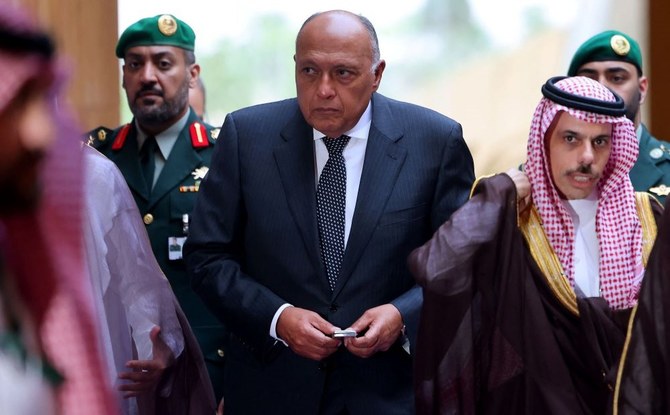
- Sameh Shoukry took part in a ministerial coordination meeting involving Arab and European countries
- Meeting, which discussed recognition of a Palestinian state, was held on the sidelines of the two-day WEF special meeting in Riyadh
CAIRO: Egypt’s foreign minister has repeated his call for a two-state solution to the Palestinian issue.
Sameh Shoukry on Monday took part in a ministerial coordination meeting involving Arab and European countries.
The meeting, which discussed recognition of a Palestinian state, was held on the sidelines of the two-day World Economic Forum special meeting in Riyadh.
Shoukry called on the international community to pressure Israel into ending its occupation of the Palestinian territories, and to support the legitimate and inalienable rights of Palestinians, said Ahmed Abu Zeid, the ministry’s spokesman.
Given the violence in Gaza and tensions in the West Bank, international parties must “assume their legal and human responsibilities to find a serious political horizon to establish a two-state solution and bring just and comprehensive peace to the region,” Shoukry added.
The foreign minister described the two-state solution as the “only path” toward peace between Palestinians and Israelis, as well as stability and coexistence among the peoples of the region.
IAEA chief Grossi to visit Iran May 6-8, Mehr says
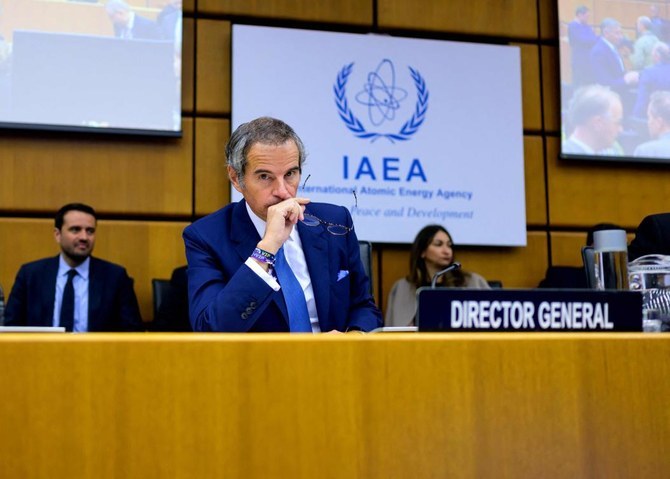
- Grossi will meet Iranian officials in Tehran before participating in the International Conference of Nuclear Sciences and Technologies held in Isfahan
- Enrichment to 60 percent brings uranium close to weapons grade
DUBAI: International Atomic Energy Agency chief Rafael Grossi is scheduled to visit Iran to take part in a nuclear conference from May 6-8 and meet Iranian officials, Iran’s Mehr news agency said on Tuesday.
“Grossi will meet Iranian officials in Tehran before participating in the International Conference of Nuclear Sciences and Technologies held in Isfahan,” the agency reported.
The IAEA chief said in February that he was planning a visit to Tehran to tackle a “drifting apart” in relations between the agency and the Islamic Republic.
Grossi said the same month that while the pace of uranium enrichment by Iran had slowed slightly since the end of last year, Iran was still enriching at an elevated rate of around 7 kg of uranium per month to 60 percent purity.
Enrichment to 60 percent brings uranium close to weapons grade, and is not necessary for commercial use in nuclear power production. Iran denies seeking nuclear weapons but no other state has enriched to that level without producing them.
Under a defunct 2015 agreement with world powers, Iran can enrich uranium only to 3.67 percent. After then-President Donald Trump pulled the United States out of that deal in 2018 and re-imposed sanctions, Iran moved well beyond the deal’s nuclear restrictions.
The IAEA said the 2015 nuclear deal was “all but disintegrated.”
‘We are with them’: Lebanon students rally for Gaza
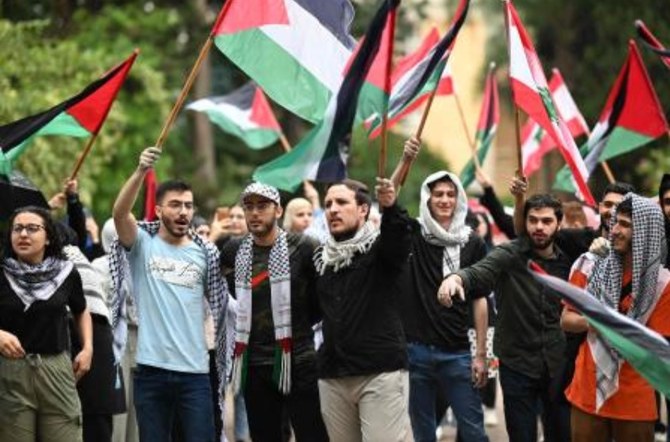
- “We are Palestine’s neighbors. If we do not stand with them today, who will?” asked AUB student Zeina
- Some students also carried banners declaring solidarity with south Lebanon, where Israel and Hamas-ally Hezbollah have exchanged near-daily cross-border fire since October
BEIRUT: Hundreds of university students in Lebanon protested on Tuesday against Israel’s bombardment of Gaza, inspired by recent pro-Palestinian demonstrations that have rocked US and European campuses, AFP correspondents said.
Dozens of students gathered at the prestigious American University of Beirut (AUB), some wearing the traditional Arab keffiyeh scarf that has long been a symbol of the Palestinian cause, an AFP photographer said.
“We are Palestine’s neighbors. If we do not stand with them today, who will?” asked AUB student Zeina, 23, declining to provide her surname.
“Around the world, students my age, from our generation, are the ones raising their voices,” she added.
The Gaza war began after Palestinian militant group Hamas’s unprecedented October 7 attacks on southern Israel, which resulted in the deaths of 1,170 people, mostly civilians, according to an AFP tally of Israeli official figures.
Hamas also took some 250 hostages. Israel estimates that 129 remain in Gaza, including 34 believed to be dead.
Israel’s retaliatory offensive, aimed at destroying Hamas, has killed at least 34,535 people in Gaza, mostly women and children, according to the health ministry in the Hamas-run territory.
The protests came as Hamas said it was considering a plan for a 40-day ceasefire and the release of scores of hostages in exchange for larger numbers of Palestinian prisoners.
Some students also carried banners declaring solidarity with south Lebanon, where Israel and Hamas-ally Hezbollah have exchanged near-daily cross-border fire since October.
The protests came as similar demonstrations swept universities across the United States, posing a challenge to administrators trying to balance free speech with complaints that the rallies have veered into anti-Semitism.
Footage of police in riot gear called in by universities to break up the rallies has circulated worldwide, recalling the protest movement that erupted during the Vietnam War.
“We renew our demand to stop the American-backed Israeli genocide against Palestinians and urgently demand to stop Zionist (Israeli) attacks” on south Lebanon, a female student told the crowd at AUB, praising “the global student movement supporting our people.”
At the nearby Lebanese American University, dozens of students gathered, raising Palestinian flags and burning an Israeli one.
“We want to convey a message to our people in Gaza: we are with them... We have not forgotten them,” Lara Qassem, 18, told AFP.
In Lebanon, at least 385 people have been killed in months of cross-border violence, mostly fighters but also including 73 civilians, according to an AFP tally.
Israel says 11 soldiers and nine civilians have been killed in the country’s north.
Arab-European ministerial statement: We endorse efforts toward achieving a Gaza ceasefire
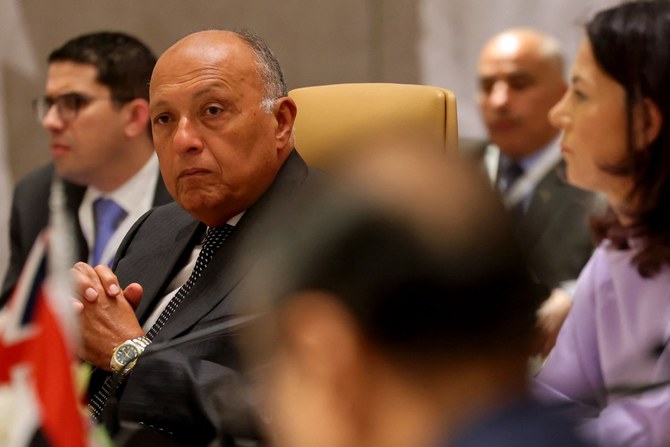
RIYADH: A joint statement from Arab and European foreign ministers highlighted critical priorities in addressing the ongoing conflict in Gaza, following a meeting in Saudi Arabia's capital, Riyadh, on Tuesday.
The statmenet called for the urgent need to halt all unilateral violations in Palestinian territories. It also called for the release of prisoners and hostages, putting an end to the war in Gaza and all illegal unilateral actions and violations in the occupied Palestinian territories, including East Jerusalem.
The meeting was chaired by Saudi Minister of Foreign Affairs Prince Faisal bin Farhan and Norwegian Foreign Minister Espen Barth Eide.
It was also attended by foreign ministers and representatives from Bahrain, Portugal, the European Union, Algeria, Jordan, Germany, the United Arab Emirates, Spain, Ireland, Italy, Belgium, Turkey, the Arab League, Slovenia, France, Palestine, Qatar, Egypt, and the United Kingdom.
Ministers reiterated their support for efforts aimed at achieving a ceasefire in Gaza. They emphasized the importance of establishing a unified Palestinian government in both the West Bank and Gaza.
Recognizing the significance of internal unity among Palestinians, the ministers have called for concerted efforts to overcome divisions and work towards a common goal of self-governance and statehood.
The statement also called for adopting a reliable and irreversible path towards implementing the two-state solution.
Arab and European foreign ministers were gathered in Riyadh on the sidelines of a two-day World Economic Forum special meeting.
Israel police say Turk shot dead after stabbing officer in Jerusalem

JERUSALEM: A Turkish national stabbed and moderately wounded an Israeli police officer in annexed east Jerusalem before being shot dead on Tuesday, police said.
Police said that a “terrorist armed with a knife arrived in the Old City of Jerusalem, on the Herod’s Gate Ascent street, charged at a border police officer and stabbed him with a knife.”
It said another officer at the scene “neutralized the terrorist” and the attacker was later pronounced dead.



